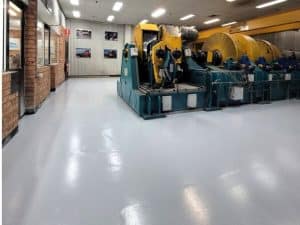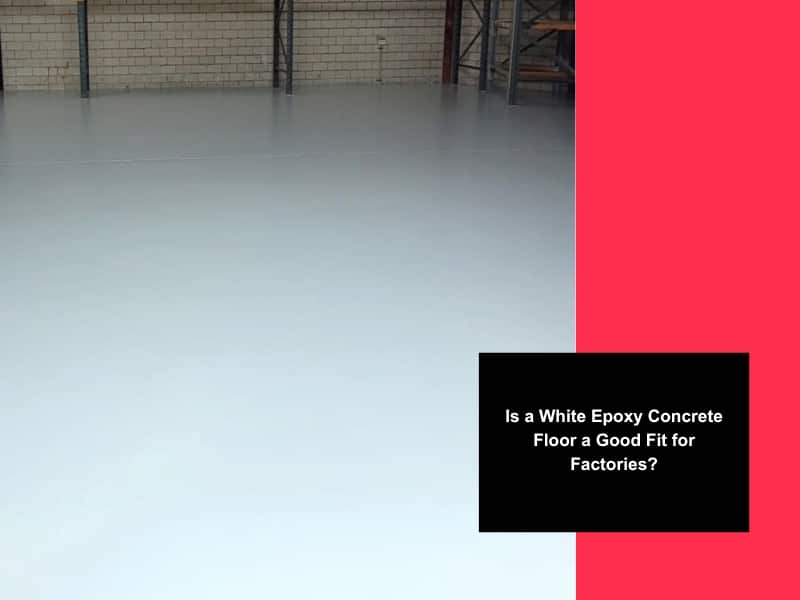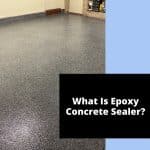Factory floors take more punishment than most surfaces. From rolling forklifts and dropped tools to chemical spills and temperature extremes, every inch of floor space must withstand industrial-grade abuse. Over time, standard concrete often begins to crack, dust, stain, and crumble, leading to unsafe conditions, costly repairs, and frustrated operations managers. Choosing the right flooring for a factory isn’t just about toughness. Cleanliness, safety, lighting, and maintenance all come into play. That’s why a white epoxy concrete floor has become a popular alternative in industrial settings. This sleek, hard-wearing surface is more than just good-looking—it offers functional benefits that traditional materials can’t match. This article explores why factory flooring fails, how the wrong surface can disrupt daily operations, and whether a white epoxy concrete floor is the upgrade your facility needs.
What are the common flooring issues faced in factories?
Concrete may start strong, but even well-poured slabs show wear under heavy use. Over time, several common issues arise:
- Surface cracking caused by dropped items or vehicle traffic
- Dusting, where the concrete top layer wears down and pollutes the air
- Staining from oil, grease, and chemicals soaking into porous surfaces
- Spalling, or chipping, due to repeated stress cycles
- Slippery zones in wet or polished areas increase injury risks
Left unaddressed, these problems affect more than just appearance. Cracks and dust can interrupt operations, trip hazards put workers at risk, and deep stains become nearly impossible to remove. Traditional concrete floors also require frequent cleaning and periodic sealing to remain usable—tasks that take time and reduce productivity.
Why do standard concrete floors fail in industrial use?
Concrete may appear sturdy, but under the constant stress of factory conditions, its flaws become clear:
- It’s porous, meaning it soaks up spills that weaken the material over time. This includes everything from water and detergent to oil, chemicals, and solvents.
- It lacks impact absorption, so dropped tools or forklifts create chips and cracks.
- It dusts, as foot traffic and wear break down the surface. These affect air quality and create cleaning nightmares, especially near sensitive equipment or production lines.
- It’s hard to clean, especially once surface damage begins.
Factories relying on basic concrete often see rising maintenance costs as the floor degrades. For these reasons, more factories are installing durable industrial epoxy coatings in their busy facilities to reduce downtime and future-proof their workspaces.
How can the wrong floor type disrupt factory operations?
A poorly chosen or poorly maintained floor can impact every part of factory life. Many teams don’t realise the full cost of substandard flooring until the symptoms start showing up in operations:
- Work slows when staff avoid damaged zones
- Accidents increase when the surface becomes slick or uneven
- Cleaning crews need more time and chemicals to manage stains and dust
- Product quality can be compromised by floor-related contamination
- Equipment may suffer wear or malfunction when rolled over, chipped, or cracked surfaces
Additionally, non-compliant floors can trigger audits or violations from safety regulators, particularly if injury reports increase. For this reason, it’s vital to review flooring performance holistically, not just based on installation costs. Solutions such as epoxy systems suited for factory environments offer a practical and lasting fix for many of these operational pain points.
How does a white epoxy concrete floor handle factory wear?
Epoxy floors are engineered for durability. The white variety isn’t just about style; it brings industrial-grade performance to high-traffic zones while boosting visibility and cleanliness. These are some standout advantages:
- The seamless coating eliminates grout lines and trap zones for debris
- Chemical resistance protects against corrosion and staining
- Abrasion resistance keeps the surface intact under constant traffic
- Load resistance ensures it won’t chip under trolleys or pallet jacks
- UV stability prevents discolouration, preserving a clean appearance

Unlike paint or sealant, epoxy is a multilayered resin system that bonds with concrete. It forms a hardened shell that endures impacts and resists moisture infiltration. In situations where forklifts, stackers, and conveyors are regularly used, it’s essential to learn how heavy-duty floors handle forklifts and machinery to avoid costly surface failures.
Can a white epoxy concrete floor improve workplace lighting?
Yes—one of the unsung benefits of a white epoxy floor is its ability to amplify available light. This upgrade can reduce your lighting costs while improving operational visibility. Here’s the light efficiency comparison:
Floor Type | Light Reflectivity | Lighting Needs | Safety Benefits |
Bare Concrete | Low | High | Moderate |
Grey Epoxy | Medium | Moderate | Imrpoved |
White Epoxy | High | Low | High |
By bouncing light from overhead fixtures and windows, white epoxy can brighten work areas, improve safety markings, and reduce reliance on artificial lighting. Additionally, incorporating reflective floors aligns well with surface finish production and QA training standards that demand clean, visible, and defect-free environments.
What maintenance is required for a white epoxy concrete floor?
Compared to bare concrete, white epoxy is easy to maintain. There’s no need for regular sealing or grinding—just a simple care routine:
- Sweep daily to remove grit and dust before it scratches the surface
- Mop weekly with neutral pH solutions; avoid acidic or abrasive cleaners
- Spot clean spills immediately to prevent long-term discolouration
- Inspect quarterly for wear or chemical exposure damage
- Recoat traffic-heavy zones every few years for continued protection
For industrial teams, the time savings add up. Maintenance crews spend less time scrubbing, and plant managers deal with fewer service calls or hazard reports.
Final thoughts on using white epoxy concrete floors in factories
A white epoxy concrete floor does more than look clean—it stays clean, resists damage, and improves the function of your workspace. For factories where safety, visibility, and durability matter, it delivers measurable benefits over standard concrete.
While no floor is indestructible, epoxy systems offer a smart mix of performance and low upkeep, making them a sound investment for high-volume industrial facilities.
For those interested in exploring whether this flooring fits specific operational needs, it’s worth seeking expert insights from Ultimate Epoxy Floors without feeling rushed into a decision. Understanding your site’s needs before committing helps you choose confidently, without any pressure.







